
Qualitative Representations
How People Reason and Learn about the Continuous World
Seiten
2019
MIT Press (Verlag)
978-0-262-03894-2 (ISBN)
MIT Press (Verlag)
978-0-262-03894-2 (ISBN)
- Titel z.Zt. nicht lieferbar
- Versandkostenfrei innerhalb Deutschlands
- Auch auf Rechnung
- Verfügbarkeit in der Filiale vor Ort prüfen
- Artikel merken
An argument that qualitative representations-symbolic representations that carve continuous phenomena into meaningful units-are central to human cognition.
In this book, Kenneth Forbus proposes that qualitative representations hold the key to one of the deepest mysteries of cognitive science: how we reason and learn about the continuous phenomena surrounding us. Forbus argues that qualitative representations-symbolic representations that carve continuous phenomena into meaningful units-are central to human cognition. Qualitative representations provide a basis for commonsense reasoning, because they enable practical reasoning with very little data; this makes qualitative representations a useful component of natural language semantics. Qualitative representations also provide a foundation for expert reasoning in science and engineering by making explicit the broad categories of things that might happen and enabling causal models that help guide the application of more quantitative knowledge as needed. Qualitative representations are important for creating more human-like artificial intelligence systems with capabilities for spatial reasoning, vision, question answering, and understanding natural language.
Forbus discusses, among other topics, basic ideas of knowledge representation and reasoning; qualitative process theory; qualitative simulation and reasoning about change; compositional modeling; qualitative spatial reasoning; and learning and conceptual change. His argument is notable both for presenting an approach to qualitative reasoning in which analogical reasoning and learning play crucial roles and for marshaling a wide variety of evidence, including the performance of AI systems. Cognitive scientists will find Forbus's account of qualitative representations illuminating; AI scientists will value Forbus's new approach to qualitative representations and the overview he offers.
In this book, Kenneth Forbus proposes that qualitative representations hold the key to one of the deepest mysteries of cognitive science: how we reason and learn about the continuous phenomena surrounding us. Forbus argues that qualitative representations-symbolic representations that carve continuous phenomena into meaningful units-are central to human cognition. Qualitative representations provide a basis for commonsense reasoning, because they enable practical reasoning with very little data; this makes qualitative representations a useful component of natural language semantics. Qualitative representations also provide a foundation for expert reasoning in science and engineering by making explicit the broad categories of things that might happen and enabling causal models that help guide the application of more quantitative knowledge as needed. Qualitative representations are important for creating more human-like artificial intelligence systems with capabilities for spatial reasoning, vision, question answering, and understanding natural language.
Forbus discusses, among other topics, basic ideas of knowledge representation and reasoning; qualitative process theory; qualitative simulation and reasoning about change; compositional modeling; qualitative spatial reasoning; and learning and conceptual change. His argument is notable both for presenting an approach to qualitative reasoning in which analogical reasoning and learning play crucial roles and for marshaling a wide variety of evidence, including the performance of AI systems. Cognitive scientists will find Forbus's account of qualitative representations illuminating; AI scientists will value Forbus's new approach to qualitative representations and the overview he offers.
Kenneth D. Forbus is Walter P. Murphy Professor of Computer Science and Professor of Education at Northwestern University. He is the coauthor of Building Problem Solvers and the coeditor of Smart Machines in Education, both published by the MIT Press.
| Erscheinungsdatum | 09.02.2019 |
|---|---|
| Reihe/Serie | Qualitative Representations |
| Zusatzinfo | 109 b&w illus. |
| Sprache | englisch |
| Maße | 152 x 229 mm |
| Themenwelt | Geisteswissenschaften ► Psychologie ► Biopsychologie / Neurowissenschaften |
| Geisteswissenschaften ► Psychologie ► Sucht / Drogen | |
| Informatik ► Theorie / Studium ► Künstliche Intelligenz / Robotik | |
| ISBN-10 | 0-262-03894-3 / 0262038943 |
| ISBN-13 | 978-0-262-03894-2 / 9780262038942 |
| Zustand | Neuware |
| Informationen gemäß Produktsicherheitsverordnung (GPSR) | |
| Haben Sie eine Frage zum Produkt? |
Mehr entdecken
aus dem Bereich
aus dem Bereich
Eine kurze Geschichte der Informationsnetzwerke von der Steinzeit bis …
Buch | Hardcover (2024)
Penguin (Verlag)
28,00 €
was sie kann & was uns erwartet
Buch | Softcover (2023)
C.H.Beck (Verlag)
18,00 €


